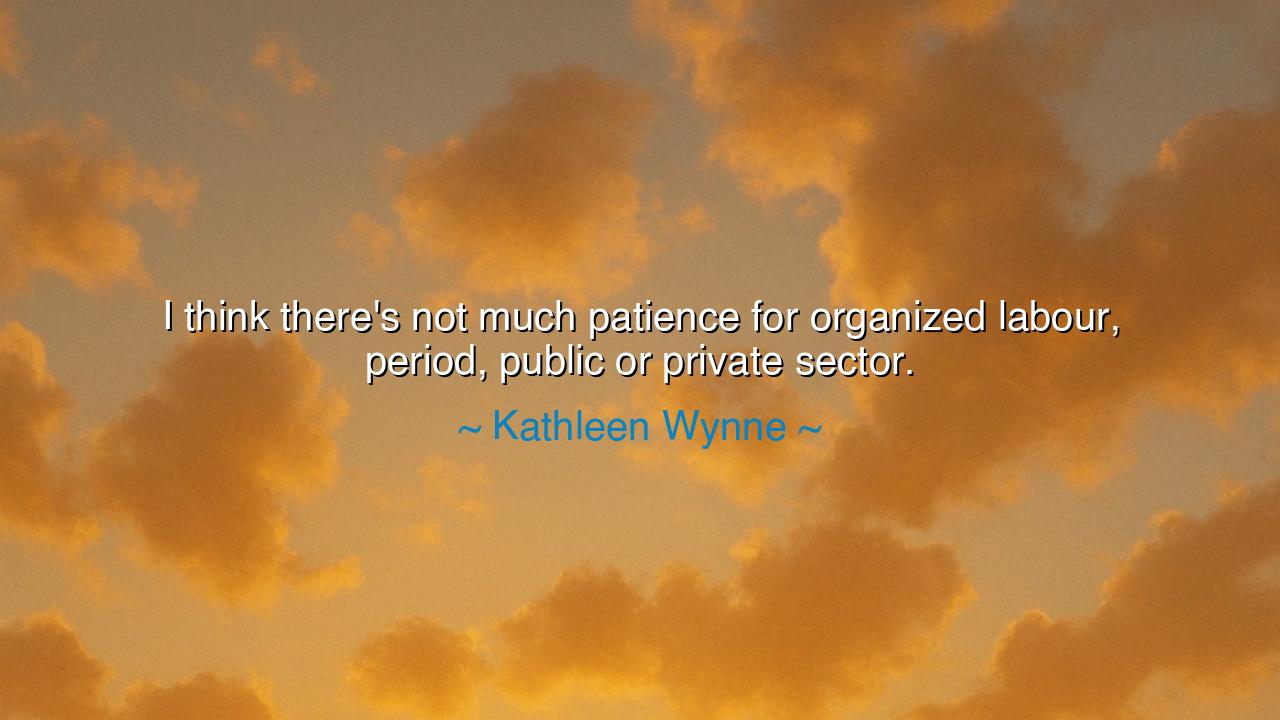
I think there's not much patience for organized labour, period
I think there's not much patience for organized labour, period, public or private sector.






Hear now the words of Kathleen Wynne, once a leader in the realm of politics, who declared with solemn clarity: “I think there's not much patience for organized labour, period, public or private sector.” This is no idle observation, but the echo of an age-old struggle between the strength of the many and the power of the few, between the rights of the worker and the impatience of those who would hurry past their cries. In this lament, we hear the sigh of history itself, for the story of organized labour is the story of blood, of courage, and of sacrifice, passed from generation to generation.
For what is organized labour, if not the gathering of voices into one? A lone worker speaks and is easily silenced; but when many bind themselves together in common cause, they become like a river that carves valleys through mountains. Yet the river, though mighty, is often unwelcome to those who dwell upon its banks. To the rulers of industry, to the administrators of states, the rising tide of workers’ demands seems disruptive, untimely, inconvenient. Thus Wynne names the truth: the world has little patience for those who seek justice by collective strength, whether in the halls of the public sector or upon the fields of the private.
Think, O listener, of the coal miners of West Virginia in the early 20th century. Poor, beaten down, they toiled beneath the earth where sunlight never reached, while their families above starved in company towns. They joined hands, they sang songs of defiance, and they struck for their dignity. Yet their masters called upon armies, upon rifles, upon hired men to crush them. Patience was denied; force was given instead. Still, from their struggle came laws, unions, protections—fruits that later generations would enjoy. This is the eternal pattern: those who demand justice are told to wait, and when they refuse to wait, they are condemned for their haste.
Wynne’s words do not despise labour, but reveal the climate of her time. In the modern age, where speed is worshiped and profits are enthroned, the patient work of negotiation is cast aside. Governments weary of strikes that slow their machinery. Corporations scoff at workers’ pleas, branding them obstacles to efficiency. And yet, in this impatience, society forgets: every right the worker possesses—every limit on hours, every safety rule, every fair wage—was born from struggle, from voices united, from the stubborn refusal of labour to vanish into silence.
There is wisdom here, for this truth is older than factories. Recall the builders of the pyramids in Egypt, who once laid down their tools and refused to work until they were given bread. The mightiest monument of Pharaoh stood still because common men demanded to be fed. Even in those ancient days, rulers found that no empire moves without the hands of its workers. The pattern repeats across time: when labour is ignored, the whole edifice trembles.
What, then, shall we learn from Wynne’s observation? That while the world may scorn and grow restless with the demands of workers, justice itself requires perseverance. Those who unite must not despair when they are told there is no patience for their cause. For change is never gifted freely; it is seized through endurance, through solidarity, through the unbreakable bond of human dignity.
So let each who listens take heed: whether you are worker or leader, do not dismiss the cry of organized labour as noise, but hear it as the heartbeat of a people. Practice patience where others will not. Seek fairness where others seek only gain. And if you are among the many who toil, remember: your voice grows stronger when joined with others. Stand together, wait with courage, act with persistence, and know this truth—the progress of humanity has always been carried forward by those who refused to be silent, even when the world had no patience for them.






AAdministratorAdministrator
Welcome, honored guests. Please leave a comment, we will respond soon